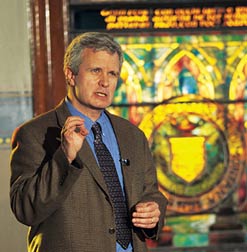 |
||
| uvm a - z | directory | search |
 |
DEPARTMENTS Campaign
Update LINKS
|

photo by Bill DiLillo
The
Origins of an Academic
Harvard Prof/UVM alumnus returns for President’s
Lecture
Tracing
one man’s personal evolutionary history, Peter Ellison ’75
recalls his first encounter with Charles Darwin’s The Origin of
Species. “It stopped me in my tracks. I had never encountered anything
so powerful in my life,” he says. Ellison, founder and principal
investigator of Harvard University’s Reproductive Ecology Laboratory,
was then an undergraduate at tiny St. John’s College, an institution
famous for its great books-centered curriculum.
The power of Darwin’s work awoke Ellison’s interest in scientific
study, a shift in focus from the humanities that his fellow St. John’s
student and future wife Pippi ’75 (who went on to become a clinical
psychologist) was going through as well. Not long after, the Ellisons
transferred to UVM for the broader options of a university. Married
at age 21, highly focused on their scientific disciplines, and living
in a downtown Burlington apartment above Sheila’s Uniform Shop,
the undergraduate Ellisons inhabited a world more akin to grad students.
They built collegial relationships with faculty, earned their departments’
top student awards, and graduated Phi Beta Kappa.
Ellison
reflected on his undergraduate days when he returned to his alma mater
last semester as part of the President’s Distinguished Lecture
Series, delivering a talk on “Evolutionary Ecology and Human Reproduction.”
He drew a full house to Old Mill’s Dewey Lounge for a wide-ranging
talk that centered on his research, much of which is based on his lab’s
innovative use of a non-invasive, field-friendly way to monitor steroid
hormones through saliva samples. Spitting into test tubes has become
such familiar business to women of the Congo’s Ituri tribe that
they have coined one of Swahili’s newer compound words — kazimate
(spitwork).
The integration of perspectives across disciplines has been a key part
of Ellison’s career, the work of his lab, and his 2001 book, On
Fertile Ground: A Natural History of Human Reproduction. One reviewer
wrote of the publication, “Peter Ellison has now turned a fearsome
set of data-rich puzzles into a single elegant story.”
The same could be said for the professor’s talk at UVM, where his
skill in front of a class was on display in a wide-ranging presentation
examining the evolution of reproductive biology and human health issues
across cultures from Nepal to Poland to Africa to Boston. His research
has looked beyond the biology of reproduction to consider how such factors
as diet, disease, and labor relate to fertility. And his laboratory’s
studies of Western societies have explored everything from the issue
of women who postpone childbirth into their late 30s to the testosterone
levels of athletes and sports fans before and after competition. (In
the midst of Super Bowl frenzy, Ellison once facetiously quipped in
a National Public Radio interview that fans of a losing team “may
have a hard time growing a beard the next morning.”)
Distilling his UVM lecture into a “take-home message,” Ellison
referenced the epidemic of obesity in the Western world where sedentary
lifestyles have skewed the balance of food intake and activity, “pushing
human biology into an area that is really very extreme.” He closed
with a thought that was equal parts reminder and warning. “The
biology we’re endowed with is the product of evolutionary history.
Procuring food, doing work, forging families — they have sculpted
our physiology. Increasingly, we live in a world very far removed from
the environments that have shaped us.”
—Thomas Weaver
